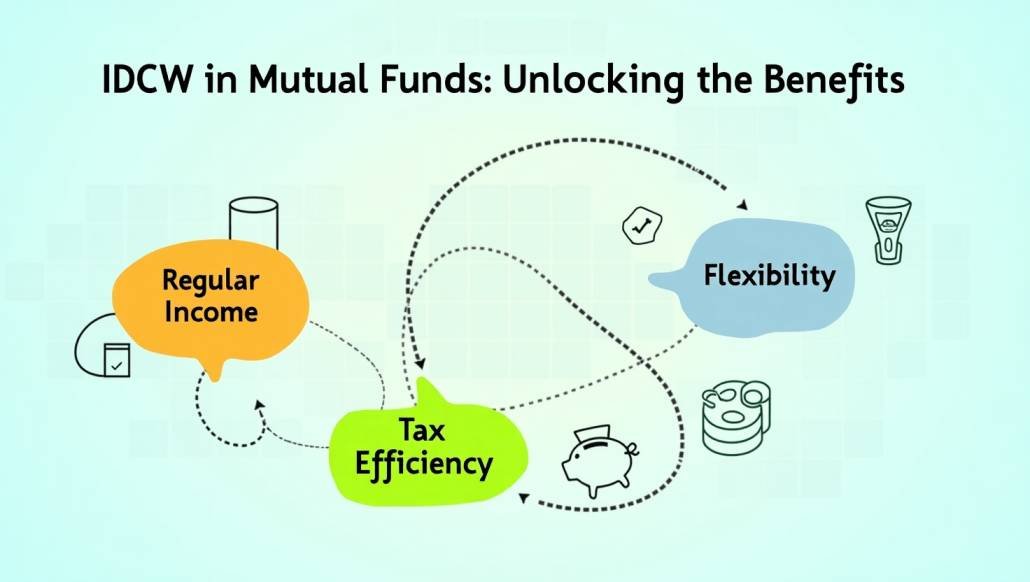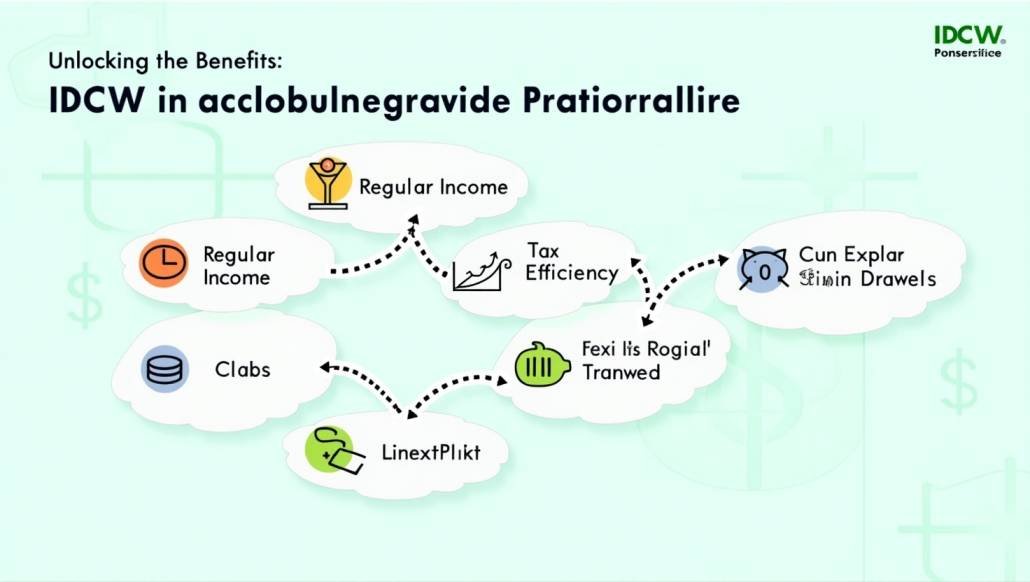Introduction
When diving into the world of investing, you might have come across the term IDCW. But what exactly is IDCW, and why should you care about it? If you’re exploring mutual funds, understanding IDCW can significantly impact your investment strategy. So, let’s break it down!
Understanding IDCW
Definition of IDCW
IDCW stands for Income Distribution cum Capital Withdrawal. It’s a nifty way for mutual funds to distribute profits to their investors. Essentially, when a mutual fund earns returns, it can choose to pass some of those returns back to you as dividends.

How IDCW Differs from Other Mutual Fund Options
Unlike growth mutual funds, which reinvest profits back into the fund to compound your investment, IDCW funds provide a regular income stream. This makes IDCW a popular choice for those looking for income rather than just capital appreciation.
The Role of Mutual Funds in Investment
Why People Choose Mutual Funds
Mutual funds serve as a bridge for many investors to access a diversified portfolio without having to pick individual stocks or bonds. They’re managed by professionals, making them a convenient choice for both novice and seasoned investors.
Overview of Different Mutual Fund Types
From equity and debt to hybrid funds, mutual funds come in various flavors. Each type has its own risk-reward ratio, catering to different investment goals.

Benefits of IDCW in Mutual Funds
Regular Income Stream
One of the standout benefits of IDCW is the regular income it offers. This can be particularly appealing for retirees or anyone who needs a consistent cash flow to meet regular expenses.
Compounding Advantages
While IDCW provides immediate benefits, the option to reinvest dividends can lead to significant compounding effects. By reinvesting, you can grow your investment even faster!
Flexibility and Liquidity
IDCW funds offer flexibility. You can choose how and when to redeem your dividends. Plus, mutual funds are generally liquid, meaning you can access your money when you need it.
Tax Efficiency
IDCW can be more tax-efficient than other income sources. Understanding the tax implications can help you maximize your returns.
Who Should Consider IDCW?
Ideal Investors for IDCW
IDCW is best suited for investors looking for regular income without sacrificing the potential for capital growth. If you prefer a balance between steady income and growth, IDCW could be your ticket.
Risk Appetite Considerations
Before diving into IDCW, assess your risk tolerance. While these funds can offer stability, they’re still subject to market risks.
How to Invest in IDCW Mutual Funds
Steps to Choose the Right Fund
Assess Your Goals: Identify your financial goals and income needs.
Research Funds: Look for funds with a consistent track record of paying dividends.
Check Costs: Pay attention to the expense ratios and any entry or exit loads.
Platforms for Investing
You can invest in IDCW funds through various platforms, including financial advisors, banks, or online investment platforms.
Risks Associated with IDCW
Market Risks
Like any investment, IDCW mutual funds carry market risks. Economic downturns can affect fund performance, leading to lower dividends.
Interest Rate Fluctuations
Changes in interest rates can have a significant impact on the performance of debt-oriented IDCW funds. It’s crucial to keep an eye on economic indicators.
Understanding Volatility
IDCW funds can be volatile, especially those investing in equities. Understanding your risk tolerance is key to navigating these fluctuations.
Comparison: IDCW vs. Growth Option
Key Differences and Their Implications
The primary difference between IDCW and growth options lies in how profits are managed. IDCW provides a regular income, while growth options focus on increasing the value of your investment.
Which Option Suits Different Investors
If you’re looking for immediate returns, IDCW might be the way to go. Conversely, if you’re in it for the long haul, a growth option may better suit your needs.
Common Misconceptions about IDCW
Myths vs. Facts
Many believe that IDCW funds are risk-free or guaranteed income sources. This isn’t true! Understanding the actual mechanics of how IDCW works can help dispel these myths.
Clarifying Doubts
It’s essential to read the fine print and understand that dividends are not guaranteed. They depend on the fund’s performance and market conditions.
Long-term vs. Short-term Investment Strategies
When to Opt for IDCW
IDCW can be a great choice for those needing short-term liquidity or regular income. However, if your goals are long-term wealth accumulation, consider your options carefully.
Balancing Your Portfolio
Incorporating IDCW into a diversified investment strategy can help balance income needs with growth potential.
Tax Implications of IDCW
How Dividends Are Taxed
Dividends received from IDCW are subject to taxation. Understanding these implications can help you strategize your investments for maximum efficiency.
Strategies for Tax Efficiency
Consider tax-saving mutual funds if you’re looking to invest in IDCW while minimizing your tax liability.
Case Studies: Successful IDCW Investments
Real-life Examples
Several investors have successfully leveraged IDCW for regular income. Their experiences can provide valuable insights!
Lessons Learned from Successful Investments
Success stories often highlight the importance of research, strategy, and patience.
Future of IDCW in Mutual Funds
Trends and Predictions
As the investment landscape evolves, IDCW funds are likely to adapt, offering new opportunities for investors.
Impact of Economic Changes
Economic shifts can affect how IDCW funds are managed and what they offer to investors.
Conclusion
In conclusion, understanding the benefits of IDCW in mutual funds can significantly enhance your investment strategy. Whether you’re seeking regular income or looking to balance growth with dividends, IDCW offers unique advantages. As always, make sure to assess your financial goals and risk tolerance before diving in.
FAQs
What is the difference between IDCW and growth funds?
IDCW provides regular income through dividends, while growth funds reinvest profits for capital appreciation.
How often are IDCW dividends paid?
Dividends in IDCW funds are typically paid out quarterly, but this can vary by fund.
Can IDCW funds lose value?
Yes, like all mutual funds, IDCW funds can lose value due to market fluctuations.
What are the best IDCW mutual funds to consider?
It’s essential to research and choose funds with a good track record, considering your investment goals.
Are IDCW funds suitable for retirement planning?
IDCW funds can be suitable for retirees seeking regular income, but it’s crucial to balance them with growth-oriented investments.